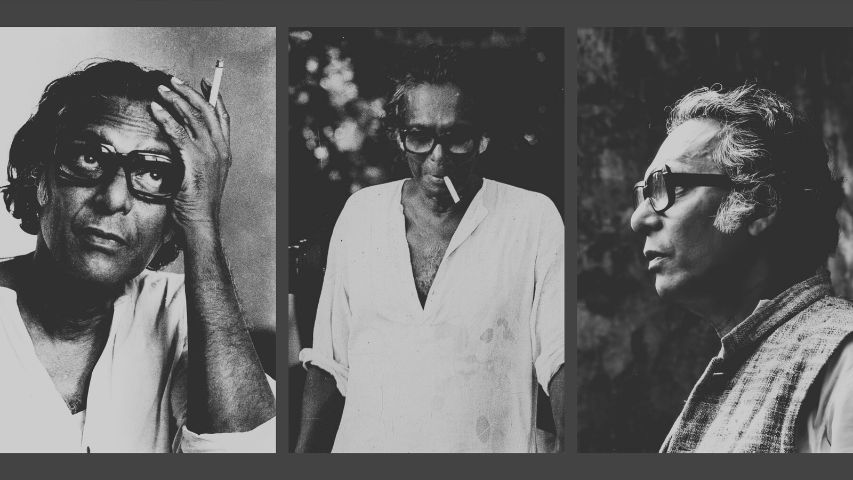-853X543.jpg)
ALTERNATIVE ENTERTAINMENT: MEMORIES OF A MRINAL SEN…WATCHER
by Monojit Lahiri December 30 2024, 12:00 am Estimated Reading Time: 4 mins, 10 secsOn his 6th death anniversary on Dec 30th, Monojit Lahiri pays tribute to the memory of India’s globally acclaimed Parallel Cinema champion and attempts to explore what made him such a fascinating personality.
Mrinal Sen, one of the most celebrated filmmakers in Indian cinema, was a master of fearless storytelling and improvisation. Renowned for his social realism, political awareness, and experimental narrative techniques, his films like Akaler Shondhane and Ek Din Pratidin explored themes of inequality, exploitation, and human resilience. His unconventional approach and anti-glamour, politics-driven cinema earned him global acclaim at prestigious film festivals like Cannes, Berlin, and Venice. With iconic actors like Shabana Azmi, Smita Patil, and Mithun Chakraborty collaborating with him, Sen’s legacy remains for content-driven cinema that invites introspection.
A Personal Encounter with Mrinal Sen
Let me begin on a personal note.
At a private party in Kolkata in the 90s, thrown by a dear friend during the film fest season, I was instructed by the hostess to make myself useful by looking after the guests, one of whom was filmmaker Mrinal Sen. Like the whole world and its uncle, I had heard of him, seen some of his films, read about him, but never personally met him. Having downed a few myself – yaar mahol ki baat hai! – I was in good spirits and so, when my turn came to inquire about Mrinal-da’s drink of choice, I went: “We have whisky, brandy, wine, beer, even Dettol!”
He was – predictably – startled by this weird zinger but recovered in a flash, bursting out laughing and slapping his hands on his thighs. “Come sit,” he said, putting his hand on my shoulder. The hostess, passing by and curious about Mrinal-da’s laughter, prayed I hadn’t misbehaved. When the director replayed my words, she glared at me hard before formally introducing me to him, smiling indulgently – through gritted teeth? – and sighed, “Dada, he is both impossible and incorrigible.”
The director was still laughing when others came by to talk to him, and I vanished. As the party wound down, I felt embarrassed by my smart-aleck remark and stayed in the shadows during the goodbyes. But Mrinal-da sought me out, warmly embraced me, shook my hand, and said, “Dettol na? Next time! Darun!”

The Maverick of Indian Cinema
The great Polish director Roman Polanski famously said, “The director is always the superstar. He makes his film. He creates it.” This agenda marked European Cinema. Hollywood in its heydays, however, had a completely different vision. There, the producer ran the show, the studio put its stamp on each film, and directors were interchangeable. Formulas were sacred.
For Mrinal Sen, however, there were no rules, and improvisation took on crazy dimensions. Actor Dhritiman Chatterjee recalls, “We were shooting Akaler Shondhane (1980), and the unit was setting up a lengthy shot with lots of dialogue between us. When all was ready – with Mrinal-da, as usual, chatting with all and sundry – he asked us to get ready to shoot. We protested that we hadn’t been given any dialogue sheets, to which his response was typical. Dialogue sheets? Didn’t he give us the gist and basic direction of the sequence? Improvise… Don’t worry… All will be fine, okay? Chalo rolling, action!”

A Legacy of Fearless Storytelling
In the sacred trinity of Ray-Sen-Ghatak, Mrinal Sen’s material stood out for its social realism, political awareness, and experiential narrative techniques. Powered by non-linear storytelling, his work deeply engaged with themes of inequality, exploitation, and human resilience, often focusing on the urban middle class’s confusion and hypocrisies. From his first film, Raat Bhore (1955), to his last, Aman Bhuvan (2002), his films were case studies in content driven by immediate concerns. Change was his bosom friend; consistency, planning, and detailed paperwork were taboo in his scheme of things.
His unconventional approach made him a favorite at international film festivals like Cannes, Venice, Berlin, and Moscow, where he received applause, accolades, and awards. Despite his politics-driven, anti-glamour cinema, Bollywood actors like Simi Garewal, Dimple Kapadia, Shabana Azmi, and Smita Patil were delighted to work with him. Amitabh Bachchan’s voice was once used in a Mrinal Sen film for which the megastar was paid a modest ₹350!
Director Srijit Mukherjee describes Sen’s legacy as “fearless experientialism,” while Aparna Sen recalls him as “the youngest old man I knew, full of fun, and that one amazingly rare quality – the ability to laugh at himself and never take his fame seriously.”
For us, his admirers, Mrinal Sen will always be remembered as someone who invited us to ask questions that matter. Sadly, in today’s consumerist age, we have replaced the ‘purpose of life’ with the ‘choice of lifestyle’ – and the loss is entirely ours.




-173X130.jpg)
-173X130.jpg)

-173X130.jpg)
-173X130.jpg)
-173X130.jpg)
-173X130.jpg)
-173X130.jpg)